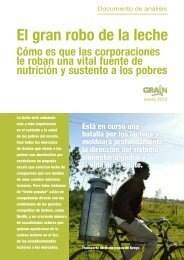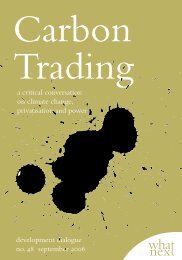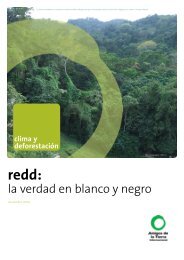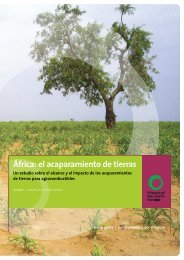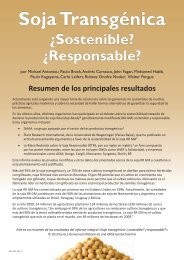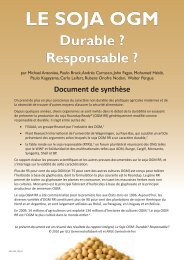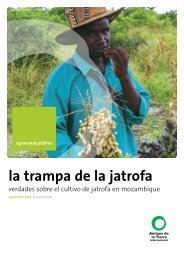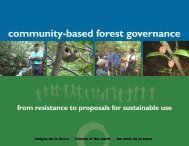Plantations, poverty and power - Critical Information Collective
Plantations, poverty and power - Critical Information Collective
Plantations, poverty and power - Critical Information Collective
Create successful ePaper yourself
Turn your PDF publications into a flip-book with our unique Google optimized e-Paper software.
71<br />
3. Pulp Inc. Profiles of seven pulp industry proponents<br />
There is a range of actors who actively promote the expansion of industrial tree plantations in the global<br />
South. These include consulting firms, UN organisations, “aid” agencies, research institutions, industry<br />
associations, industry publications <strong>and</strong> some NGOs. This network of actors, sometimes works together,<br />
sometimes in competition, but all tending towards keeping the status quo: an increasingly large scale,<br />
wood-based, globalised pulp industry.<br />
The pulp <strong>and</strong> paper industry today looks the way it does to a large extent because it has relied on the<br />
advice of northern-based consultants. Thirty years ago, Ken King, then-head of forestry at the FAO,<br />
pointed out that developing countries very often could not afford to borrow the huge amounts of money<br />
required to build a modern pulp mill. King described the “international clubs of consultants” who<br />
travelled the world recommending precisely such large scale developments. This section starts with a<br />
profile of the largest <strong>and</strong> most notorious of these forestry consulting firms: Pöyry.<br />
Most industries form associations <strong>and</strong> alliances to promote their interests <strong>and</strong> in the case of the pulp <strong>and</strong><br />
paper industry these organisations can be extremely <strong>power</strong>ful. In Europe, the Confederation of European<br />
Paper Industries (CEPI) constantly supports the interests of the European pulp <strong>and</strong> paper industry, issuing<br />
press releases, lobbying at a European level, commissioning research <strong>and</strong> publishing industry-friendly<br />
reports.<br />
Aid agencies continue to play a crucial role in promoting the expansion of the pulp <strong>and</strong> paper industry<br />
<strong>and</strong> its industrial tree plantations in the South. This role is illustrated by looking at the way the Asian<br />
Development Bank, the World Bank’s International Finance Corporation <strong>and</strong> the European Investment<br />
Bank support the industry.<br />
The United Nation’s Food <strong>and</strong> Agriculture Organisation supports the pulp <strong>and</strong> paper industry in several<br />
ways. Its definition of plantations as “planted forests” allows companies <strong>and</strong> governments to claim that<br />
they are reforesting, when in fact, they are establishing vast areas of industrial tree monocultures. No one<br />
would describe a sugar plantation as a “planted grassl<strong>and</strong>”, yet this is precisely what the industry <strong>and</strong> its<br />
supporters do when they describe industrial tree plantations as “planted forests”.<br />
FAO recently produced a set of “voluntary guidelines on planted forests”. The guidelines may include<br />
some useful statements, but they are voluntary, there is no enforcement mechanism <strong>and</strong> no penalty for<br />
companies which choose to ignore the guidelines entirely. Ultimately the guidelines are a sham which<br />
will do nothing to prevent the expansion of industrial tree plantations in the South. On the contrary, the<br />
guidelines promote this expansion.<br />
This section ends with a look at the Forest Stewardship Council (FSC), an organisation which is<br />
effectively greenwashing the spread of industrial tree plantations in the South. FSC has certified millions<br />
of hectares of monoculture tree plantations as “well managed”. By doing so, FSC is undermining local<br />
struggles in the South. By remaining members of the FSC, NGO members of FSC also risk undermining<br />
these struggles. By promoting paper products manufactured from FSC-certified plantations as<br />
“environmentally friendly”, they are also guilty of misleading the public.



